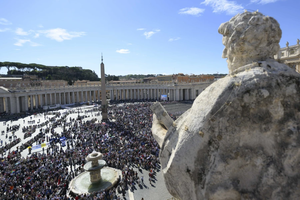Father Flanagan Had No Microphone — His Work at Boys Town Did the Talking
Hollywood made Father Edward Flanagan famous, but he remained focused on God and the good of others.

A strong case can be made that Father Edward Flanagan, the priest who single-handedly created Nebraska’s Boys Town in 1917, was the first pop-culture priest in America. The documentary Heart of a Servant about the life and times of this remarkable man points in a saintly direction as well.
A sickly child growing up in Ireland, the young Flanagan was tasked by his family with tending sheep because, as Father Flanagan would always insist, “I was not much good for anything else.” His humble self-assessment notwithstanding, Father Flanagan’s shepherding skills proved profound in the number of troubled boys he guided toward Christ and to better lives.
A few decades after Boys Town’s founding, Hollywood came calling. MGM, probably the most prestigious movie studio during the Golden Age of Hollywood, gave the story of Boys Town the “A” picture treatment, assigning one of its biggest stars, Spencer Tracy, the role of Father Flanagan. It is a good film, if a little on the saccharine side of the spectrum, but Tracy’s performance, even if not close to the power of the real story, imbued a lovely humanity that earned Tracy an Academy Award for “Best Actor.” The film elevated Father Flanagan’s profile all the higher, but for Father Flanagan, it served the greater purpose of elevating the image of Boys Town, which translated to much-needed monetary support.
In the mid-1930s, before television, before the internet, there was radio. And one of the biggest radio stars at this time was another priest, Father Charles Coughlin. Father Coughlin’s radio broadcasts were fire-breathing politically charged tirades. He was as vociferous as Father Flanagan was humble. Father Coughlin’s “targets” were political and perceived religious enemies. The antisemitism of his radio speeches was palpable, and he did little to disguise his comfort with fascist governments overseas.
While Father Flanagan toiled quietly in the fields of Boys Town, Father Coughlin’s fiery rhetoric garnered 80,000 fan letters a week. But like all meteoric rises, there was an equal and opposite descent. America’s entry into World War II, fighting fascism, and the gradual understanding of the breadth and scope of the horrors of the Holocaust, soured the public on Father Coughlin, and the priest faded away from the airwaves.
Father Flanagan could have been a firebrand. He could have railed against a variety of social injustices. He did not. He chose the “quiet” path, like when he came up, upon opening Boys Town, against the discriminatory racial laws of Nebraska, which prohibited white children from being educated in the same classroom as Black children. Father Flanagan learned that if he had a post office on the premises, he could claim a kind of municipal autonomy and organize his school however he wished — and so he did. And when Japanese families were being dispossessed on the West Coast during World War II, he invited some of those families to take up residence in Boys Town.
That sickly little boy tending his sheep in Ireland was not the loudest or the strongest, but his life illustrates a good way of spreading the word of God — all with a servant’s heart.
- Keywords:
- father edward flanagan
- boys town

















